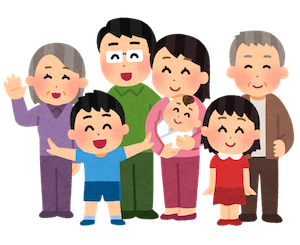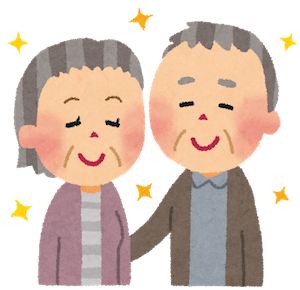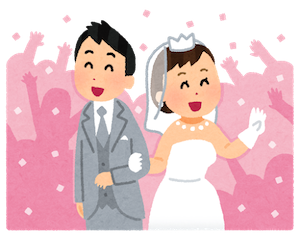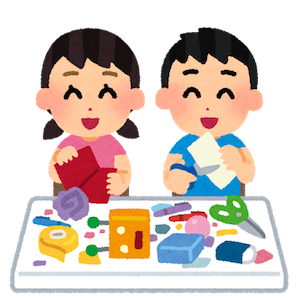
Howdy Information


My family ~Let’s introduce your family in japanese!~
Talk about your family in japanese with your friends, tell about your mother and father.
・Oka-san (Mother) Introduce to superior… Haha
・Oto-san (Father) Introduce to superior… Chichi
・Ryo-shin (Parents)
Practice;What does your father do (work)?
Tell about your brother and sister
・おにいさん Oni-san (older brother) Introduce to superior… Ani
・おねえさん One-san (older sister) Introduce to superior… Ane
・弟(おとうと) Otouto (younger brother)
・妹(いもうと) Imouto (younger sister)
when you talk about your friends or someone’s brother and sister, we say “Otouto san”, “Imouto san”.
older brother and younger brother…Kyoudai older sister and younger sister…Shimai
Practice: Do you have bother or sister? If you have, talk about it.
Tell about grand father and grand mother

・おじいさん Ojii san (Grand father) Introduce to superior… Sofu
・おばあさん Obaa san (Grand mother) Introduce to superior… Sobo
・ひいおばあさん Hii Obaa san (Great-grand mother)
・ひいおじいさん Hii Ojii san (Great-grand father)
Practice: Tell your grand mother and grand father’s memory.
If you married…

How to call your partner after marrige. ・Otto (husband) ・Tsuma (wife) husband and wife… Fuufu
When you talk about your friends or someone’s husband and wife, we say Goshujin and Okusan. Also, someone’s children call Okosan.
How to call your child

Practice: Which one do you want, boy or girl in the future? Also, what do you plan to name your child?
Tell about your pet

Pet… pet (same as English) To introduce your pet…
○○ wo katte imasu.(I have…) ex) Inu wo katte imasu. (I have a dog.)
Practice: Do you have a pet? What kind of pet do you have?
Let’s introduce your family!
・わたしの家族は、○人です。(Watashi no kazoku wa ○nin desu.) 例)わたしの家族は4人です。(ex) Watashi no kazoku wa yonin desu.)
・○○と○○と○○がいます。(○○to ○○to ○○ga imasu.) 例)母と父と兄とわたしです。(ex) Haha to Chichi to Ani to Watashi desu. ) 母と父と兄がいます。( Haha to Chichi to Ani ga imasu.)
Ask to your friend
Let’s ask to your friend about family.
・家族は何人いますか?・Kazoku wa nannin imasuka? (How many people do you have in your family?)
・誰がいますか?・Dare ga imasuka? (Who is in there?)
・おいくつですか?・Oikutsu desuka? (How old are they?)
・どこに住んでいますか?・Doko ni sunde imasuka? (Where do they live?)
・お仕事は?・Oshigoto wa? (What is their job?)
Let’s plactice conversation!
A:家族は何人いますか? B:わたしの家族は6人です。 祖母と母と父と妹です。 それからペットの猫を飼っています。 A:妹さんはおいくつですか? B:24さいです。 A:お仕事は? B:学校の先生をしています。
大切な家族を日本語で紹介できるように練習してみましょう!
A: Kazoku wa nannin imasuka? B: Watashi no kazoku wa rokunin desu. Sobo to haha to chichi to imouto desu. Sorekara pet no neko wo katte imasu. A: Imouto san wa oikutsu desuka? B: Nijyu-yonsai desu. A: Oshigoto wa? B: Gakko no sensei wo shiteimasu.
Let’s paractice and introduce your fabulous family in Japanese!
【Vegetables】What is your favorite food?~Let’s study food names in Japanese.~
【Fruits】 What is your favorite food? -Let’s study food names in Japanese!
You are familiar with Japan⁉ Do you know about Japanese typical food?
Which side are you on? For breakfast,bread or rice? ~various conversation~
What is your hobby? Let’s become able to listen and answer about hobby in Japanese!
Discover, Learn, Contribute, Connect
How to Say “My Family” in Japanese
Gaining the ability to discuss your family in Japanese is a wonderful way to deepen your language skills and connect with native speakers on a more personal level. In this guide, we will explore how to express “my family” in both formal and informal ways. Additionally, we will provide useful tips, examples, and highlight any regional variations when necessary.
Table of Contents
Formal Expressions:
When speaking formally in Japanese, you should use honorific language to show respect and politeness towards the person you are addressing. Here are some ways to say “my family” formally:
- Watashi no kazoku: This is the most general and neutral way to say “my family” in formal situations. “Watashi” means “I” or “me,” and “kazoku” translates to “family.” This expression is suitable for any situation.
Example: Watashi no kazoku wa yonin desu. (My family consists of four people.)
- Watakushi no kazoku: Using “watakushi” instead of “watashi” adds an even more formal tone to the expression. This form is preferable in extremely formal and professional settings.
Example: Watakushi no kazoku wa kokusai-katei desu. (My family is an international household.)
Informal Expressions:
When speaking informally, such as with close friends or family members, you can use a more relaxed form of language. Here are some informal expressions for “my family”:
- Uchi no kazoku: The term “uchi” is commonly used in casual conversations to refer to “home” or “house.” So, saying “uchi no kazoku” translates to “my family” in an informal and familiar manner.
Example: Uchi no kazoku wa isshoni gohan o tabemasu. (My family eats dinner together.)
- Ore no yo-na kazoku: In more colloquial language, especially among male speakers, “ore” is used instead of “watashi” to mean “I.” This form expresses a casual and masculine tone and can be used to say “my family” in an informal context.
Example: Ore no yo-na kazoku de wa, minna atarashī animēshon o mimasu. (My family likes to watch new animations.)
Tips for Talking about Family in Japanese:
– When referring to a specific family member, such as “my mother,” “my father,” or “my brother,” you can simply use the word “haha” for mother, “chichi” for father, and “ani” for brother, respectively. For example, “my mother likes to cook” translates to “haha wa ryōri ga suki desu.”
– To talk about multiple family members, you can attach the number before the word “nin” (person) after specifying the family relationship. For instance, “my two older sisters” would be “nee-san ga futari” in Japanese.
– It is crucial to remember that Japanese often omits the subject if it is clear from the context. So, if the conversation revolves around your family, you can drop “watashi” or any other pronoun when stating information about them.
– Practice correct pronunciation by listening to native speakers or utilizing language-learning apps. Pronunciation plays a vital role in making yourself understood accurately.
Being able to discuss “my family” in Japanese shows your genuine interest in communicating with others on a more personal level. In formal situations, use expressions like “watashi no kazoku” or “watakushi no kazoku” to convey respect. For informal occasions, try “uchi no kazoku” or even “ore no yo-na kazoku” to add a casual touch. Remember to use appropriate vocabulary when referring to specific family members and practice good pronunciation.
With this guide, you are now equipped to comfortably discuss your family in Japanese. So go ahead, embrace the warmth of the language, and connect with native speakers on a deeper level!
Related Guides:
- How to Say “Hi, Family” in Japanese
- Guide: How to Say “I Love My Family” in Japanese
- How to Say “I Love You” in Japanese to Family: A Comprehensive Guide
- How to Say “I Love You” to a Family Member in Japanese
- Guide: How to Say “I Love You” to Family in Japanese
- How to Say “Spy x Family” in Japanese: A Comprehensive Guide
- Guide: How to Say “This is My Family” in Japanese
- How to Say Your Family in Japanese: A Comprehensive Guide
About The Author
Madeline Jean
Japanese Family Terms – How to Address Your Own Relatives and Others’
In this guide, you will learn the fundamentals of the Japanese family terms , focusing primarily on informal and formal terms. By learning how to use both informal and formal terms, you will be able to talk about your own family (informal) as well as address someone else’s family (formal) .

- 1.1 “Family” in Japanese
- 1.2 “Family member” in Japanese
- 2 Addressing family members in Japanese
- 3.1 Immediate family in Japanese
- 3.2 Grandparents in Japanese
- 3.3 Parents in Japanese
- 3.4.1 Sister in Japanese
- 3.4.2 Brother in Japanese
- 3.5 Children in Japanese
- 3.6 Spouse in Japanese
- 4.1 Relatives in Japanese
- 4.2 In-laws in Japanese
- 5.2 Someone else’s relatives
- 5.3 Your in-laws
- 6 Why learn the Japanese Family Terms?
Japanese Family
In Japan, like in any other Asian country, the family is regarded as the most important sector of society. The family members are treated with respect. This is evident in the language used toward them. Each family members have their own name according to one’s relationship with that member.
A Japanese family is made up of immediate family members such as father, mother, and siblings and extended families such as grandmother, grandfather, aunt, uncle, and cousins.
In this guide, we’ll teach you the different Japanese family terms you can use to address your own family members and other people’s family.
“Family” in Japanese
The word for “family” in Japanese is かぞく (kazoku). So when talking about your family, you can say わたしの かぞく (watashi no kazoku) which means “My family”.
For example:
わたし の かぞく は かんこく から きました。(watashi no kazokuwa kankokukara kimashita.)
My family is from Korea.
わたし の かぞく は たべる の が すき です。(watashi no kazokuwa taberunoga suki desu.)
My family likes to eat.
“Family member” in Japanese
The word “family member” in Japanese is かぞく の いちいん (kazoku no ichiin).

Addressing family members in Japanese
The Japanese have different family words to address family members . The family words vary according to whose family member are you addressing or talking about. The Japanese family words are different when you’re talking about or addressing your own family members and when it’s a member of a different family.
In a while, you’ll be adding a few more words to your Japanese vocabulary .
Addressing your own family
Getting familiar with these terms should be the first step to learning how to address family members in Japanese. These terms are used commonly in Japan, so you will probably hear them quite often throughout day-to-day life.
Remember to use these words when you’re talking about your own family. Use it when you’re in a casual and informal setting or situation.
Immediate family in Japanese
An immediate family is きんしんしゃ (kinshinsha) in Japanese . It’s made up of grandparents, parents, siblings, children, husband, wife, and spouse. In this lesson, we’ll group the Japanese family words according to these groups.
Grandparents in Japanese
Grandparents in Japanese is そふぼ (sofubo). When talking about or addressing your grandfather you can say そふ (sofu) while grandmother is そぼ (sobo).
Parents in Japanese
Parents in Japanese are called りょうしん (ryōshin) while father is ちち (chichi) and mother is はは (haha).
Siblings in Japanese
Siblings are made up of brothers and sisters. Siblings in Japanese are called きょうだい (kyōdai).
Sister in Japanese
There are two ways to say sister in Japanese when talking about your own sister.
You’ll say あね (ane) for your older sister and いもうと (imouto) for your younger sister.
Brother in Japanese
Just like the word sister, there are two ways to say brother in Japanese when talking about your own brother.
You’ll say あに (ani) for your older brother while おとうと (otouto) for your younger brother.
Children in Japanese
Children are called こども (kodomo) in the Japanese language. But they have a specific word used for a female and male child.

Spouse in Japanese
The word spouse is はいぐうしゃ in Japanese . However, in Japan, they have exact words to call their respective spouse.
List of Family Words in Japanese
Here’s the summary of all the Japanese family member vocabulary you’ll use to address your own family.
Relatives in Japanese
To add to your Japanese vocabulary for family members, let’s learn about addressing your relatives. The word relative is translated as しんせき (shinseki).
そこで おおく の しんせき に あった. (sokode ookuno shinsekini atta)
I met many relatives there.
あなた の しんせき は どこ に すんでいます か. (anatano shinsekiwa dokoni sundeimasuka)
Where do your relatives live?
Below is a list of people related to your own family in the Japanese language.
In-laws in Japanese
The word “in-law” is いんせき (inseki) in Japanese. However, when it comes to addressing your in-laws, the general rule of thumb is to add “義理の”(ぎりの | giri no )before their relation in the family.
Although “義理の” is not a direct translation of “in-law” (義理 actually refers to the Japanese value of duty and obligation), you can add “義理の” as a prefix to change the relation to “in-law.”
Example sentences:
私の 妹 は6歳です。
わたし の いもうと は ろく さい です。
Watashi no imōto wa roku sai desu.
My younger sister is 6 years old .
あに は だいがく きょうじゅ です。
Ani wa daigaku kyōju desu.
My older brother is a university professor .
私は 義理の姉 がいます。
わたし は ぎりのあね が います。
Watashi wa giri no ane ga imasu.
I have a (older) sister-in-law .
Addressing someone else’s family
Now that you’re comfortable talking about your own family, next we will look at words that you should use when addressing someone else’s family. As mentioned earlier, there’s a different way of addressing or talking about family members of another family.
Below is a list of Japanese vocabulary for someone else’s family members. A lot of these terms end with an honorific suffix さん ( -san ) to emphasize respect and politeness toward others.
Remember to use these words especially when you are addressing or talking about someone else’s family. You’ll also use this list of vocabulary when you are in a serious and formal setting or situation.
Tip : If you want to be extra respectful, change the さん (- san ) honorific to a 様 (さま – sama ) honorific (For example: お父さん otōsan → お父 様 otō sama )
Someone else’s immediate family
Below is a table of words you’ll use to address or talk about other’s immediate family members.
Someone else’s relatives
Earlier we learned the vocabulary we need to address people related to our own family. This time, we’ll learn how we can address people related to someone else’s family.
For the word “relative” in the Japanese language, ごしんせき (goshinseki) is used.
Let’s take a close look at the Japanese vocabulary below. Pay close attention to how the written kanji changes for uncle, aunt, and cousin, depending on the context (i.e., older or younger for aunts/uncles and male or female for cousins).
Your in-laws
When addressing someone else’s family members, it’s important to address them respectfully by adding the honorific suffix さん ( -san ).
私はあなたの ご両親 にお会いしたいです。
わたし は あなた の ごりょうしん に おあい したい です。
Watashi wa anata no goryōshin ni oai shitai desu.
I want to meet your parents .
山田さんの お父様 は何をされている方ですか?
やまださん の おとうさま は なにを されている かた ですか?
Yamada-san no otōsama wa nani o sareteiru kata desu ka?
What does Yamada-san’s father do for a living?
Why learn the Japanese Family Terms?
It’s very important for you to learn the terms used in a family in Japanese. For example, you are at a formal dinner party, and your manager asks you about your family. As you describe some of your family members, you also decide to ask a question about their family. Now, are you going to use the same words that you used to describe your own family when you ask a question about your manager’s family?
It’s not just limited to conversations about your family that make learning the Japanese terms used in a family important. Whether it may be filling out an emergency contact or casually talking about your family at your company’s 歓迎会 ( kangei-kai or welcome party), knowing some basic family terms in Japanese should come in handy at some point. But memorizing just a few terms won’t always cut it, as there are different words that are used for different occasions.
Let us know how many members are there in your family in the comment section by using the Japanese family terms you learned today!
12 replies to "Japanese Family Terms – How to Address Your Own Relatives and Others’"
Thanks for this concise review of Japanese family terms list using kanji, kana, and romaji.
Awesome, thanks for your comment! ^^ If you want, you can visit the 90 Day Japanese Blog to find more great content on learning Japanese. You can also subscribe to our YouTube channel for video lessons. You’ll get updated when our latest videos become available.
І was able to find good informatіon from your blog articles.
Thanks for your comment! I’m glad that our articles have been useful to you. ^^ To find more great content on learning Japanese, visit the 90 Day Japanese Blog . You can also subscribe to our YouTube channel for video lessons. You’ll get updated when our latest videos become available.
Thank you so much for your help,I have learned too much from your article, it’s very useful for me, keep it up.
Great, thanks for your comment! I’m glad that our article has been valuable to you. ^^ You can also subscribe to our YouTube channel for video lessons. You’ll get updated when our latest videos become available.
Thanks for your help. This article helped me get an A on my Japanese assignment. Its great
Thanks for the comment, Timmee! I’m glad that our article has been helpful to you. ^^ If you want more lessons, you can check our our blog post. ^^ You can also subscribe to our YouTube channel for video lessons. You’ll get updated when our latest videos become available.
Thank you for this. I spend years making my own list but I lost it in the hundreds of files I have generated during my years of Japanese study. You really saved me with this!
You’re welcome, Andy! Glad you found our article helpful! (^▽^)
Thank you for this list. How do people refer to their siblings in conversation when they need to be specific? For example: they have multiple older brothers. Is it common/acceptable to say “ani + first name”?
Hi Sam! Yes, it’s acceptable to use “ani + first name” (e.g., “Ani Jiro”) to specify which older brother you’re referring to, but it’s not very common in casual conversations. Most families prefer using names, nicknames, or honorifics like “-nii” (e.g., “Jiro-nii”) instead.
Many families prefer to use either birth order references or nicknames to differentiate between siblings in casual conversation.
When introducing your older brother, you can say “ani no [name].” For example, こちらは私の兄の[名前]です (This is my older brother, [Name]).
I hope this helps!
Leave a Reply Cancel Reply
Your email address will not be published.
Save my name, email, and website in this browser for the next time I comment.

IMAGES
VIDEO
COMMENTS
How to translate this sentence to Japanese "My family has 5 people"? My family has 5 people :(私の)家族は五人います (watashi no kazokuha gonin imasu). You can use or remove 私の(watashi no), the meaning of the sentence won't change. Above is: Write a paragraph about family in Japanese.
あにとはは is used to refer to family members in Japanese grammar, whereas おにいさんとおかあさん is referred to as other people's older brothers and mothers. Otherwise, tidied up grammar a bit. Good job bud! Keeping in mind you're in Japanese 1, I would say you're learning at a good rate :)
Talk about your family in japanese with your friends!Tell about your mother and father・Oka-san (Mother)Introduce to superior... Haha・Oto-san (Father)Introduce to superior... Chichi・Ryo-shin (Parents)Practice;What does your father do (work)?Tell about your brother and sister
All in Japanese Hiragana including title Title of your essay is "my family" (Write it in Japanese) Start your essay with "I will introduce my family." You have to have at least 4 family members. (Your family doesn't have to be a real family.
Learn the basic expressions used to introduced one's family
Write about your family. Describe your family members. Make a questionnaire, ask several people to answer the questions. Write a report, quoting the responses using と言いています. Write a diary entry every day for two weeks. Write a thank you letter using てくれてありがとうございます. Write a personal ad looking for friends.
When speaking formally in Japanese, you should use honorific language to show respect and politeness towards the person you are addressing. Here are some ways to say "my family" formally: Watashi no kazoku: This is the most general and neutral way to say "my family" in formal situations. "Watashi" means "I" or "me," and ...
The word for "family" in Japanese is かぞく (kazoku). So when talking about your family, you can say わたしの かぞく (watashi no kazoku) which means "My family". For example: わたし の かぞく は かんこく から きました。(watashi no kazokuwa kankokukara kimashita.) My family is from Korea.
Writing an essay about your friend in Japanese Hello everyone! In this post, Learn Japanese Daily will introduce to you. Read More. Japanese essay. ... Write a paragraph about family in Japanese In this post, we will introduce to you the lesson : Write a. Read More. ← Previous; Categories: Janapanese for beginners.
Extended Family in Japanese: Since there are so many family words, I decided to split the vocabulary into another section for extended family. These will also follow the same organizing format (if you need to refresh what this means read the previous section!): P = Polite (Use with strangers, acquaintances, older people, people you need to respect)